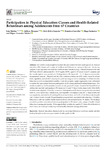Mostrar o rexistro simple do ítem
Participation in Physical Education Classes and Health-Related Behaviours among Adolescents from 67 Countries
| dc.contributor.author | Martins, João | |
| dc.contributor.author | Marques, Adilson | |
| dc.contributor.author | Gouveia, Élvio-Rúbio | |
| dc.contributor.author | Carvalho, Francisco | |
| dc.contributor.author | Sarmento, Hugo | |
| dc.contributor.author | González Valeiro, Miguel | |
| dc.date.accessioned | 2022-04-19T18:27:17Z | |
| dc.date.available | 2022-04-19T18:27:17Z | |
| dc.date.issued | 2022-01-15 | |
| dc.identifier.citation | Martins, J.; Marques, A.; Gouveia, É.R.; Carvalho, F.; Sarmento, H.; Valeiro, M.G. Participation in Physical Education Classes and Health-Related Behaviours among Adolescents from 67 Countries. Int. J. Environ. Res. Public Health 2022, 19, 955. https://doi.org/10.3390/ijerph19020955 | es_ES |
| dc.identifier.issn | 1660-4601 | |
| dc.identifier.uri | http://hdl.handle.net/2183/30490 | |
| dc.description.abstract | [Abstract] The present study sought to examine the associations between participation in physical education (PE) classes and a range of health-related behaviours among adolescents. Secondary analysis of self-reported data from the Global Student Health Survey, collected between 2010 and 2017 from 222,121 adolescents (N = 117,914 girls; 49.0%; aged 13–17 years) from 67 countries and five world regions, was carried out. Participation in PE classes (0, 1–2, ≥3 days/week) was the independent variable. Physical activity (PA); sedentary behaviour (SB); active travel to school; fruit, vegetables, and alcohol consumption; and smoking; as well as adopting ≥5 of these healthy behaviours; were the dependent variables. Complex samples logistic regressions were performed to explore the associations between participation in PE classes and health-related behaviours. The results revealed that 18.2% of adolescents did not take part in PE classes. A total of 56.7% and 25.1% of adolescents reported participating in PE classes on 1–2 and ≥3 days/week, respectively. Only 26.8% of adolescents adopted ≥5 healthy behaviours. Participation in PE classes was positively associated with PA, active travel, fruit consumption, and vegetable consumption (only for ≥3 days/week), but was negatively associated with meeting SB recommendations, and with not smoking (only for girls and ≥3 days/week). Overall, PE participation was positively associated with adopting ≥5 healthy behaviours, with favourable results found for those who attended more PE classes. The findings revealed a positive association between participation in PE classes and a range of health-related behaviours among adolescents. This suggests that, worldwide, quality PE should be delivered at least 3 days per week up to daily to promote healthy lifestyles among adolescents | es_ES |
| dc.language.iso | eng | es_ES |
| dc.publisher | MDPI | es_ES |
| dc.relation.uri | https://doi.org/10.3390/ijerph19020955 | es_ES |
| dc.rights | Atribución 4.0 Internacional | es_ES |
| dc.rights.uri | http://creativecommons.org/licenses/by/4.0/ | * |
| dc.subject | Physical education | es_ES |
| dc.subject | Physical activity | es_ES |
| dc.subject | Sedentary behaviour | es_ES |
| dc.subject | Nutrition | es_ES |
| dc.subject | Smoke | es_ES |
| dc.subject | Alcohol | es_ES |
| dc.subject | Healthy lifestyle | es_ES |
| dc.subject | Adolescence | es_ES |
| dc.subject | Preventative health | es_ES |
| dc.subject | Public health | es_ES |
| dc.subject | Educación física | es_ES |
| dc.subject | Actividade física | es_ES |
| dc.subject | Comportamento sedentario | es_ES |
| dc.subject | Nutrición | es_ES |
| dc.subject | Tabaco | es_ES |
| dc.subject | Estilo de vida saudable | es_ES |
| dc.subject | Adolescencia | es_ES |
| dc.subject | Saúde preventiva | es_ES |
| dc.subject | Saúde pública | es_ES |
| dc.subject | Actividad física | es_ES |
| dc.subject | Comportamiento sedentario | es_ES |
| dc.subject | Estilo de vida saludable | es_ES |
| dc.subject | Salud preventiva | es_ES |
| dc.subject | Salud pública | es_ES |
| dc.title | Participation in Physical Education Classes and Health-Related Behaviours among Adolescents from 67 Countries | es_ES |
| dc.type | info:eu-repo/semantics/article | es_ES |
| dc.rights.access | info:eu-repo/semantics/openAccess | es_ES |
| UDC.journalTitle | International Journal of Environmental Research and Public | es_ES |
| UDC.volume | 19 | es_ES |
| UDC.issue | 2 | es_ES |
| dc.identifier.doi | 10.3390/ijerph19020955 |
Ficheiros no ítem
Este ítem aparece na(s) seguinte(s) colección(s)
-
GI-ESAFEX - Artigos [45]






